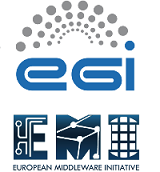Speaker
Impact
One of the main achievements during the first activity period was the production of an inventory of basic services and monitoring tools needed by every VO, and emphasizing characteristics considered important like purpose of the service; hardware requirements; known issues; services capacities and costs from the perspectives of the major players involved: service provider, VO operations and User Support. The impact of such document intends to raise the awareness of VO Administrators regarding the range of services needed to support standard VO requirements, and understand their associated costs. VOs should understand that providing services to their VO members require an effort that should be at least partially assumed by the VO. This information is an important tool to assist VO Managers in deciding and planning the range of services needed, and whether these services can be operated by the VO or provided through EGI catch-all instances.
Another major achievement was the official establishment of a communication tool (via a dedicated GGUS support unit, https://gus.fzk.de/ws/ticket_info.php?ticket=62742) where VO managers can ask for help and clarifications. The impact is that dedicated staff is ready to provide guidance through the VO life cycle; assist VO managers through the process of deploying technical services; and receive VO managers requests (in terms of services/tools).
Finally, the VO management documentation was revised, and a Frequently Asked Question wiki page was created to properly address new comers VO issues (https://wiki.egi.eu/wiki/VO_Services).
All these achievements are contributing so that VO operations become more transparent from all points of view: VO management, operation and usage. The future actions are also pointing in that direction with the testing of VO tools for monitoring.
Description of the work
The main VO Services objectives are the support and documentation of the VO management activities by guiding VO managers during the various steps of the VO life-cycle process; to assist VO managers in deploying, using and adapting technical services which may simplify their user community access to the infrastructure and promote collaboration within the VO; to bridge VO managers requirements with EGI / NGIs resource providers availabilities; and finally, to collect feedback from VOs and VRCs regarding the technical services provided by EGI and by the different NGIs, and map them into requirements for service improvement.
In order to accomplish the previous objectives, the activities since the beginning of the project have been centered in an effort and cost evaluation (from the operation point of view) of services and tools which were found to be useful for VOs and VRCs. Simultaneously, the VO Management process have been revised and documented, and improvement requirements have been communicated to the developers of the services and tools used during that process. Finally, an official communication channel for some of the VO Management activities such as triggering VO validations, or clarification of dubious information with the VO Manager has been established via a dedicated support unit in GGUS.
Future work will continue with the identification and establishment of VO catch-all core services that must be installed and operated by the different NGIs; and with the analysis and testing of tools aimed for VO monitoring, where a VO centric NAGIOS installation appears as the best candidate. We will also continue to investigate the possibility to extend the use of dashboards developed for HUCs under the TSA3.2 activity for new emerging communities. Presently, these dashboards are based on commercial software databases, which prevents the possibility to extend its use to a broader range of communities. Other alternatives are being explored.
Conclusions
The technical integration of any research community as a Virtual Organization in a production grid environment is a demanding task from the operation point of view. In EGI, that activity has further constrains due to the decentralized political organization, where NGIs play a leading role in the project governance model. VO Services activity intends to agile part of the difficulties which new emerging VO managers face in the operation and technical instantiation of their VO. During this first period of the EGI project that was achieved through evaluation of services and tools which were found to be useful for VOs and VRCs. Simultaneously, some steps of the VO Management process have been revised, and improvement requirements have been communicated to the developers of the services and tools used during that process. The enhancement of VO activities management is expected to continue through future activities as testing of new VO monitoring framework offered from Nagios tool.
Overview
The EGI-InSPIRE project aims at supporting both “Heavy user communities” (HUC) and new emerging communities. While HUCs are directly supported through specific tasks in the EGI SA3 activity, new emerging communities are lacking from this organization and resources, and take-off can fail if assistance is not provided. The VO Services subtask, developed in the context of the EGI TNA3.4 Technical Services activity, aims at providing documentation and services to these emerging communities, allowing them to start up their own Virtual Organizations, Virtual Research Communities and boost their EGI integration and usage of the production infrastructure.

